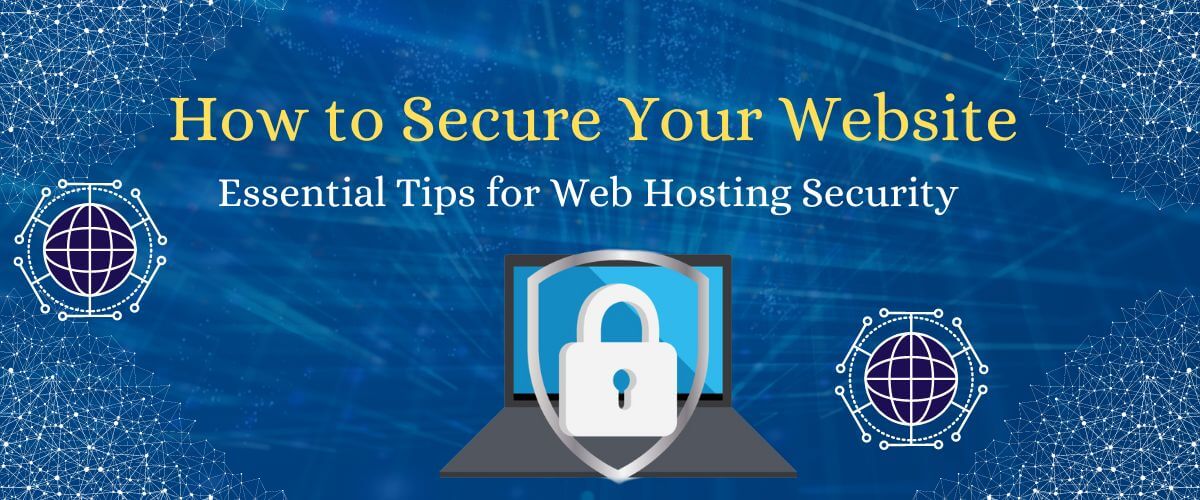
In today's digital landscape, ensuring web hosting security is of paramount importance. With cyber threats becoming more sophisticated and prevalent, it is crucial to adopt effective measures for your website security. This comprehensive guide provides essential tips and insights to fortify your website's security, empowering you with the knowledge and strategies to safeguard sensitive data, defend against malicious attacks, and establish a trusted online presence. Whether you are a seasoned webmaster or a novice website owner built on Indian VPS Hosting, these tips are a priority to learn for web server security. But before that, we will try to give you some basic ideas about web hosting security.
Web hosting security refers to the measures and practices implemented by web hosting providers to protect websites and web applications from various security threats and vulnerabilities. It involves safeguarding the hosting infrastructure, server hardware, and software components to ensure the confidentiality, integrity, and availability of hosted websites.
It's important for website owners to choose reputable hosting providers that prioritize security and have a strong track record of implementing robust security measures. Regularly updating website software, using strong passwords, and employing additional security measures like website scanners and security plugins can also enhance the overall security of hosted websites. Let us read several tips helpful in web hosting security.
Choose a Reliable Web Hosting Provider:
The foundation of website security begins with selecting a reputable web hosting provider. All Indian businesses looking for a web hosting provider must conduct thorough research to find an Indian dedicated server company that offers a strong track record of security measures, reliable server infrastructure, and prompt technical support. Opt for a provider that prioritizes website protection and implements regular security updates and patches.
Keep Software and Applications Up to Date:
Outdated software and applications can leave your website vulnerable to security breaches. Ensure that your website's content management system (CMS), plugins, and other third-party applications are always up to date. Developers frequently release updates to address security vulnerabilities, so regularly installing these updates is crucial for maintaining a secure website.
Implement Strong Passwords and User Authentication:
One of the most common security vulnerabilities is weak passwords. To enhance web server security, enforce strong password policies for all user accounts, including administrators, employees, and contributors. Encourage the use of complex passwords that include a combination of letters, numbers, and special characters. Additionally, consider implementing two-factor authentication (2FA) for added protection.
Utilize SSL Certificates:
Secure Sockets Layer (SSL) certificates are essential for encrypting data transmitted between your website and its visitors. SSL certificates ensure that sensitive information, such as login credentials and payment details, is protected from interception by unauthorized individuals. Implementing SSL certificates establishes trust with your audience and improves your website's security.
If You Want To install an SSL certificate on a Windows Server, you need to follow these steps.
1. Creating a CSR (Certificate Signing Request):
2. Create a .well-known directory for SSL Domain authentication
3. Installing the SSL Certificate in Windows:
4. Applying the SSL Certificate to the Website:
Regularly Backup Your Website:
Frequent backups are an integral part of website protection. In the event of a security breach or a system failure, having up-to-date backups can help restore your website quickly and minimize potential damage. Choose a web hosting provider that offers automated backup solutions or consider utilizing third-party backup services.
Implement a Web Application Firewall (WAF):
A Web Application Firewall (WAF) acts as a protective layer between your website and potential threats. It analyzes incoming web traffic, filters out malicious requests, and blocks attacks, such as SQL injections and cross-site scripting (XSS). A WAF can significantly enhance web server security by identifying and mitigating potential threats in real time.
Monitor and Audit Website Activity:
Regularly monitoring your website's activity can help you detect and respond to security incidents promptly. Utilize security monitoring tools to track website traffic, monitor file integrity, and receive alerts for suspicious activities. Conduct periodic security audits to identify potential vulnerabilities and address them proactively.
Secure File Uploads and User Input:
Allowing users to upload files or input data on your website can expose it to security risks. Implement strict validation measures to ensure that user inputs are thoroughly checked and sanitized to prevent common vulnerabilities, such as file inclusion exploits or SQL injections. Restrict file upload permissions and scan all uploaded files for potential threats.
Protect Against Distributed Denial-of-Service (DDoS) Attacks:
Distributed Denial-of-Service (DDoS) attacks can cripple your website by overwhelming it with excessive traffic. Mitigate the risk of DDoS attacks by employing security measures such as traffic filtering, rate limiting, and utilizing Content Delivery Networks (CDNs) to distribute the load and absorb attack traffic.
Educate Website Users:
Educating your website users about best practices for online security can contribute significantly to overall website protection. Provide clear instructions on creating strong passwords, avoiding suspicious links and downloads, and recognizing phishing attempts. Emphasize the importance of regularly updating antivirus software and operating systems to safeguard against emerging threats. Additionally, educate users about the risks associated with sharing sensitive information online and encourage them to exercise caution when disclosing personal or financial details.
Using Secure And Encrypted Connections
It is crucial to emphasize the significance of using secure and encrypted connections, such as HTTPS, when transmitting sensitive data. Furthermore, You should never ignore the dangers of public Wi-Fi networks and the potential for data interception. By using secure and encrypted connections, you can stay safe online, you can have a more secure experience.
Conclusion
As cyber threats continue to evolve and become more sophisticated, implementing robust web server security measures like those found in Windows VPS hosting solutions is essential to safeguard your website and protect sensitive data. By adhering to these above essential tips for web hosting security, you can mitigate risks, safeguard your website, and provide a safe browsing experience for your users. Remember, investing in website security is an investment in the reputation, integrity, and success of your online presence.